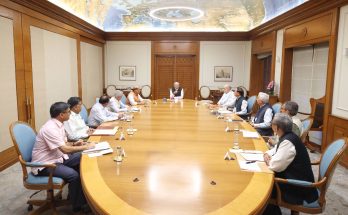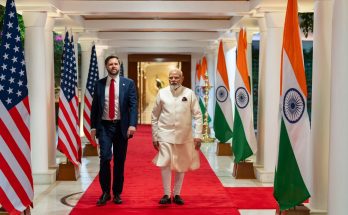
SAMARKAND: Ahead of the formal opening of the eight-nation SCO summit, Uzbekistan’s Coordinator of the SCO Rakhmatulla Nurimbetov underlined the pivotal importance of India in the Central Asia-focused grouping as it gears up to take presidency of SCO.
“India has a huge potential, is a growing Asian country which plays a crucial role in the region on international policy and the economy,” said Mr. Nurimbetov, while answering a question from India Writes Network on the expectations from India as it takes over the presidency of SCO from Uzbekistan for the summit to be hosted next year. “This is the first time India will host the SCO summit. We hope this will be a very productive chairship,” said the Uzbek diplomat at a curtain-raiser press conference in the historic city of Samarkand on September 14.
Mr. Nurimbetov, also Head of Department for Cooperation with regional organisations in Uzbekistan’s Ministry of Foreign Affairs, was speaking ahead of the visit of foreign leaders for the SCO summit.
PM Modi will touch down in Samarkand on the evening of September. Besides speaking at the SCO summit, he will also have bilateral meetings with Russian President Vladimir Putin, Iranian President Ebrahim Raisi and host Uzbek President Shavkat Mirziyoyev. There is no clarity yet on whether there will be a bilateral meeting between PM Modi and Chinese President Xi Jinping.

More than six months after the Ukraine crisis which has shaken the region, Mr Nurimbetov underscored that the SCO charter respects international norms and territorial integrity and sovereignty. This will be reflected in the Samarkand Declaration at the end of the SCO summit on September 16. Uzbekistan, along with other Central Asian nations, has taken a neutral stand on the Russian military operation in Ukraine due to extensive economic and security ties with Russia.
Outlining the agenda and deliverables expected from the Samarkand summit, Mr Nurimbetov said that the summit will chart the growth of the SCO for the next 20 years. “The summit will set the stage for the new phase of cooperation in SCO,” Mr Nurimbetov told journalists from different countries in the cultural capital of Uzbekistan.
The Uzbek diplomat also highlighted that the SCO would reflect the “common position” of all SCO members on “economic restrictions practised in world politics”, an obvious a reference to sanctions by the West against Russia, Belarus and Iran. The Samarkand Declaration will back an “inclusive government” in Afghanistan that would support the rights of women and girls, a long-standing demand of India and the international community. He added that while individual SCO members may have direct dealings with the Taliban regime in Kabul, the SCO as a multilateral organisation did not recognise Afghanistan. Afghanistan, which has an observer status, will not be present at the summit due to the events of last year, said Mr Nurimbetov. He was alluding to the takeover of Afghanistan by the Taliban, which sent shockwaves across the region and the world.
(Manish Chand, Founder-CEO, India Writes Network and Director, Centre for Global India Insights, a think tank focused on global affairs, is in Samarkand to report on and analyse the SCO summit).
Author Profile

- Manish Chand is Founder-CEO and Editor-in-Chief of India Writes Network (www.indiawrites.org) and India and World, a pioneering magazine focused on international affairs. He is CEO/Director of TGII Media Private Limited, an India-based media, publishing, research and consultancy company.
Latest entries
 India and the WorldApril 21, 20253T Template for India-US Mega Partnership
India and the WorldApril 21, 20253T Template for India-US Mega Partnership India and the WorldFebruary 14, 2025Modi-Trump COMPACT: India, US launch MEGA partnership for 21st century
India and the WorldFebruary 14, 2025Modi-Trump COMPACT: India, US launch MEGA partnership for 21st century India and the WorldJanuary 28, 2025Modi, Trump talk global peace, focus on strategic connect
India and the WorldJanuary 28, 2025Modi, Trump talk global peace, focus on strategic connect India and the WorldDecember 16, 2024Kazan Spirit: India, China SRs to hold talks in Beijing
India and the WorldDecember 16, 2024Kazan Spirit: India, China SRs to hold talks in Beijing







